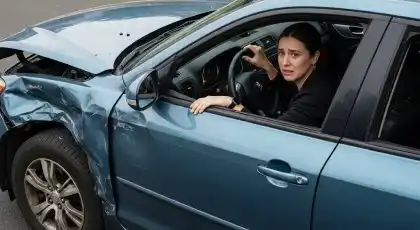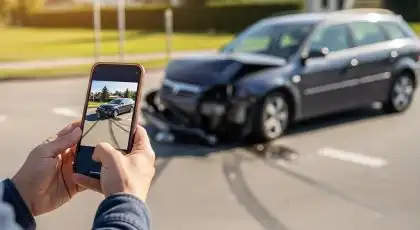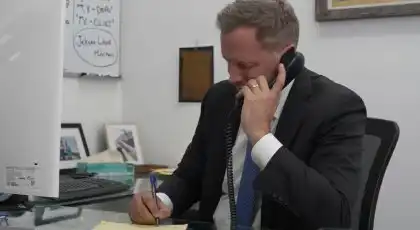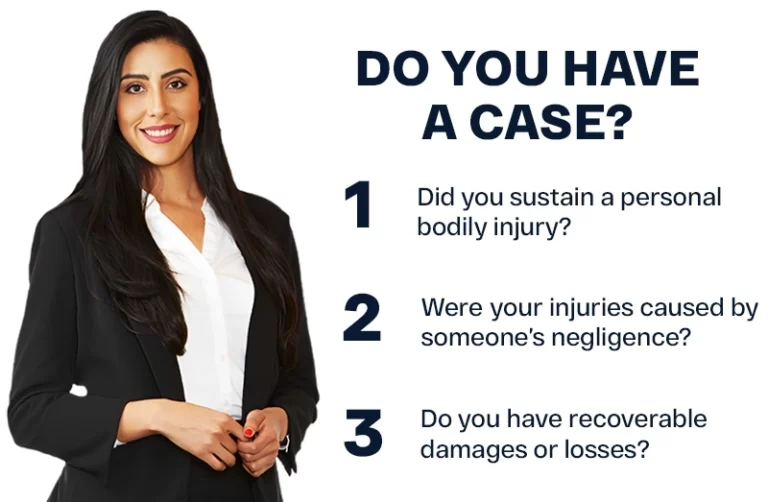TL;DR: You can still file an insurance or injury claim after a car accident without a police report, but you’ll need strong alternative evidence like photos, witness statements, and medical records. In California, reporting to the DMV may be required.
Table of Contents
If no police report is filed after a car accident, there’s no official record of what happened. You’ll be responsible for gathering your own evidence in case problems come up later.
You can rely on other types of evidence, such as:
- Photos or videos from the scene
- Medical records
- Vehicle damage reports
- Witness statements
- Communication with the other driver
If you’re unsure whether you should get a lawyer for a car accident that wasn’t your fault, gathering solid evidence early will make the decision clearer.
Insurance companies may scrutinize your claim more closely, especially if the other driver disputes your version of events. This could lead to delays, lower settlement offers, or outright denials.
To strengthen your case, gather as much evidence as possible right away and report the accident to the DMV if it meets reporting thresholds. You can also consult an attorney for help building a strong claim without a police report.
At Arash Law, our car accident lawyers assist injured clients in understanding their rights based on their situation. Even without a police report, we can help with gathering evidence and explain your legal options during the claims process. Call us at (888) 488-1391 for a free initial consultation.
What Happens If You Don’t Have A Police Report?
When there’s no police report, there’s no official summary of the traffic accident from law enforcement. This can make it harder to prove what happened, especially if the other driver disputes your version of events or if injuries surface later. A missing report can be fixed later if you know how to obtain a traffic accident report in California, but delays make claims harder.
In California, officers don’t always file a report, especially for minor accidents with no injuries or obvious damage. If no one calls 911, the crash might go unreported entirely.
A typical police report can include:
- Time, date, and location of the crash.
- Statements from drivers and witnesses.
- Road and weather conditions.
- Description of vehicle damage.
- Any traffic citations issued.
This kind of documentation can support your case if you need to file an insurance or injury claim. However, it is important to remember that the absence of police reports may be alright if parties are cooperative, the accident is minor, or the case is pretty straightforward. For more complex situations, like hit-and-runs or disputed liability, car accident lawyers can guide you in gathering alternative evidence and preparing your claim.
Why Some Accidents Don’t Get Reported Right Away
Some motor vehicle accidents go unreported at first. People often delay calling the police, especially when they think the crash was minor or hope to avoid involving insurance.
Drivers may have various reasons for not reporting an accident immediately, such as:
- Shock & Confusion — The crash may leave someone disoriented and unsure of what to do.
- Accident Seems Minor — Some assume they don’t need to report a fender bender.
- Private Settlement — Drivers may agree to handle the damage without involving insurance or the police.
- Unaware of Deadlines — Some people don’t know they have a deadline to file a report in California.
- Lack of Knowledge — Most people do not know the process or how to report an accident.
- No Means to File a Report — Some people can’t report the accident right away because they don’t have a phone, access to transportation, or enough time to visit a police station.
- Fear of Blame — Some avoid reporting because they’re worried they caused the crash.
- Impact on Insurance Coverage — Some people wait because they worry that their insurance rates may increase or their coverage might change.
- Medical Emergencies — Immediate injuries may take priority over contacting law enforcement.
Certain incidents, such as hit-and-runs, Lyft accidents, or motorcycle accidents, often require extra evidence because of the higher risk of serious injuries and disputes over who is at fault. Documenting the accident as soon as possible may help support your version of events and reduce potential disputes. In the event that there was no immediate report of the crash, a car accident attorney may guide you on how to document the incident and advise you on your legal options.
Can You Still Get Compensation Without A Police Report?
Yes. It may still be possible to pursue compensation after a car accident, even without a police report. While an official report can help support your claim, it’s not the only form of evidence that you may be able to use. Other pieces of evidence may show liability and demonstrate the extent of damages.
Depending on the circumstances, you may be able to claim the damages available in your personal injury case, such as:
- Medical Bills — Expenses or costs for doctor’s visits, hospital stays, medicine, chiropractic care, or other future treatments you need to heal.
- Lost Income — Payment for the days you couldn’t work due to your injuries. If your injuries are serious and you can’t return to work for a time, you may also qualify for compensation for future lost wages.
- Pain and Suffering — Covers the physical and emotional impact of the crash. Damages for pain and suffering may include disfigurement, mental anguish, and others.
- Loss of Enjoyment of Life — Some injuries may keep you from doing things you once loved, like playing sports, dancing, or going out with friends. You may get compensation for activities you can not do while recovering from your injuries.
Personal injury lawyers can evaluate your medical records, lost wage documentation, and other proof to calculate the potential value of your claim. Some insurance companies may question claims that lack a police report, which makes other forms of documentation especially important. A lawyer for car accidents may also be able to collect available evidence, coordinate with witnesses, and explain your options for seeking compensation.
Filing A Claim With Your Insurer
You may also have the option to recover damages through your insurance. Some optional add-ons, like uninsured/underinsured motorist (UM/UIM) coverage, can help in certain cases. While this coverage is optional, insurers are required to offer it when you buy liability insurance.
In California, it is presumed that you have this coverage unless you specifically waive it. It is especially helpful in hit-and-run accidents or when the at-fault driver is uninsured or underinsured. In such situations, working with an uninsured motorist accident attorney can help you understand your rights and assist you through the claims process.
When you have uninsured motorist coverage, your insurance company may be able to cover the following, based on your policy limits:
- Medical bills
- Property damage
- Pain and suffering
- Other losses
While a police report is an important piece of evidence, other forms of documentation may still support your claim, especially in minor accidents. If you already have an attorney, you may try getting free accident lawyer advice in this situation. Car accident claim lawyers can assist in complex cases, such as accidents without police reports or disputes with insurance companies.
What Evidence Can Help If You Don’t Have A Police Report?
If you wonder what happens if you don’t have a police report, the answer is that there could be some challenges depending on your case. Nevertheless, you may still be able to rely on other forms of proof. Available evidence may help show who caused the crash and how the car accident affected you.
Evidence for car accident claims may include:
- Photos or Videos — Capture damage, skid marks, traffic signs, and the surrounding area.
- Medical Records and Bills — Keep all doctor or hospital records. These documents show what injuries you had and how much your treatment costs.
- Personal Statement or Notes — Write down what you remember about the accident. Include the time, place, what happened, and how you felt. These notes can help you stay consistent when talking to insurers or lawyers.
- Witness Statements — Ask anyone who saw the crash to write or state what they saw. Their words can support your story.
- Traffic or Security Camera Footage — Look for traffic or security cameras around the area. Footage from these cameras may show how the crash happened.
- Vehicle Repair Estimate — Get a written estimate from a repair shop. This estimate can show the extent of vehicle damage and the cost of repairs.
- Phone Records — Phone records might help prove that the other driver was distracted, which led to the accident.
- Statements from the Other Driver — If the other driver admitted fault at the scene, write down exactly what they said. Their account may help support your claim.
These pieces of evidence help establish the facts of the accident and demonstrate the extent of your injuries and damages. A missing accident report may not always mean missed compensation. Keep everything organized and provide relevant documents to your injury attorney or insurance company. The more evidence you collect, the better your chances of supporting your version of events.
What To Do After A Car Accident If There Are No Police Involved
A car accident can be overwhelming. If the police did not respond or if the incident is a minor collision, there are steps you might consider to get proper documentation of the incident:
- Check for Injuries & Call 911 — Even if no officers arrive at the scene, emergency medical services may still be necessary.
- Exchange Information — Exchange names, phone numbers, email addresses, driver’s license, insurance details, and plate number with the other driver. Note the other car’s make, model, and color.
- Document the Accident Scene — Take photos or videos from all angles, including skid marks, road signs, and other relevant details. It is helpful to capture vehicles involved, the road condition, and other possible causes of the incident.
- Speak With Witnesses — Gather contact details and ask onlookers for their accounts. Their statements could be vital in case of a dispute.
- Consult a Doctor — Even if you feel okay, minor injuries can still be serious. It’s always a good idea to see a doctor as soon as possible and get a medical evaluation.
- Contact Your Insurance Company — Call your insurance company’s representative to start a claim.
- Report to the DMV — Each state has its own rules for reporting accidents to the DMV. You may need to report a crash based on how serious the damage or injuries are or how much the repairs cost. For instance, in California, you need to report an accident to the DMV within 10 days if it led to injuries, death, or property damage over $1,000.
- Talk to a Lawyer — You may consult with a car accident lawyer to better understand your rights and available legal options. This includes situations where you were driving your own car or involved in a rideshare crash. In the latter, Uber accident lawyers can help address the unique insurance rules and liability issues that often arise.
Frequently Asked Questions About Car Accidents With No Police Report
A car accident with no police report doesn’t always mean options are not available. Below are answers to common questions about what to do, how to protect your rights, and how to file a claim when there is no official report.
What Happens After A Car Accident With No Police Report?
After a car crash, you may still be able to file a car insurance claim without a police report, depending on the specifics of your case. You may be able to pursue an injury claim against the at-fault individual if you have evidence to prove their liability. The absence of a police report may not be an issue if you have other pieces of evidence that may show liability and damages.
In cases of hit-and-runs or if the at-fault driver has insufficient or no insurance, victims may file a claim with their insurers if they have UM/UIM coverage. This policy may help cover damages. If complexities arise, seeking legal guidance from car accident lawyers may be able to help.
What Happens If The Other Driver Refuses To Provide Information?
If the other driver refuses to provide their insurance information, calmly inform them of their legal obligation to do so after an accident. If they still refuse, consider contacting the police. A formal police report can be crucial for proving what happened and determining fault.
Additionally, you may document the scene, including the other vehicle’s details, license plate number, and the driver’s description, to assist authorities, your insurance company, and your car accident attorney.
What If The Other Driver Denies Fault?
If the other driver denies fault, you may still be able to dispute their claim by presenting strong evidence. Documentation such as photos, witness statements, and dashcam footage can help establish the other driver’s liability. This is especially true in rear-end collisions, where fault might seem straightforward but can still be contested. Rear-end accident lawyers can help gather evidence and challenge any inaccurate claims from the other party.
Even if you don’t have all the necessary evidence initially, a car accident lawyer may be able to assist in gathering additional proof to support your case. However, it’s important to manage expectations. If sufficient evidence is not available, it may be more difficult to challenge their denial and recover damages. It may be better to discuss the details of your case with an attorney to get more personalized advice.
Should I Still File A Police Report?
Yes. If you sustained injuries in a car accident, you should still file a police report, even if officers did not respond at the scene. A report creates an official record that can support your injury claim and help establish who was at fault. Notifying the authorities can also be beneficial if the at-fault individual fled the scene. Understanding what steps to take after a hit-and-run may improve how you handle the situation.
In California, the law requires you to file a police report within 24 hours if anyone was injured or killed. If no officer filed one at the scene, you or a passenger must report the accident at the nearest police station or California Highway Patrol office.
You also need to file an SR-1 form with the DMV within 10 days if anyone is injured, a death has occurred, or property damage has been more than $1,000. This requirement applies even if you already filed a police report. Failing to submit the SR-1 can result in a suspended driver’s license.
Even if you feel okay or believe the crash was minor, filing a report may help protect your claim. Some injuries may take time to appear. Without documentation, the other driver may later deny what happened or may try to shift the blame.
If you need assistance in filing a report or understanding your responsibilities, lawyers for car accidents can explain your next steps based on the circumstances of the incident.
How Long Do I Have To File A Claim In California?
California has time limits for filing car accident claims, depending on who you’re trying to sue. These time limits are called the statutes of limitations. If you miss them, you could lose your chance to get money for your injuries or car damage.
For most car accidents, you have two years to file a lawsuit. This deadline applies if you’re suing another driver, a car company, or a mechanic. However, you must file a claim within six months if you were in a crash involving a government vehicle or agency, like a city bus or road crew. After that, they have 45 days to respond. If they deny your claim or don’t respond, you have another six months to take them to court.
There are some special rules, such as:
- If the victim was a minor when the crash happened, the two-year clock doesn’t start until they turn 18.
- If you didn’t know you were hurt immediately, the time limit might resume once you discover the injury.
- If the person you’re trying to sue is out of state, the time limit usually pauses until they return or can be served with legal action.
Waiting too long could affect your right to get compensation for medical bills, car repairs, or other costs. So, it may be beneficial to act quickly and know your rights. If you’re wondering, “Do I need a personal injury lawyer ?” the answer may depend on the details of your case. If you want to know if you have a valid claim, complete our “Do I Have A Case?” form.
Consult A Car Accident Lawyer For Personalized Guidance
Getting into a car accident without a police report can make your claim more challenging, especially when proving fault or dealing with insurance companies. However, you may still have the right to pursue compensation for your injuries, property damage, and other losses, depending on the circumstances.
At Arash Law, our experienced lawyers for car accidents can build a case based on the facts available. We can review your situation, help gather relevant documents, and explain each step of the process to you.
Our car accident attorneys are available to discuss your situation and explain your legal options. Contact us for a free initial consultation.












